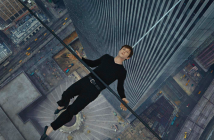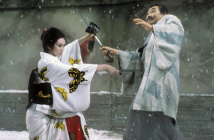Editor’s Note: This month marks the 25th Anniversary of Edward Scissorhands. Feel free to share your memories of this film in the comments section below.
Tim Burton was certainly an imaginative director back when he first started working in features. Kicking off his feature career with Pee-Wee’s Big Adventure (which also kick-started Paul Reubens’ screen career and helped launch his TV show Pee-Wee’s Playhouse), an odd but entertaining film about a man-child whose bike is stolen and his quest to reclaim it. He followed with Beetlejuice, an even odder film than his first, then his break-out film Batman, which took a darker tone than previous screen incarnations of the character (but was somewhat more in keeping with the comic books). Between Batman and its sequel, Batman Returns, Burton made the utterly unique and touching Edward Scissorhands. Not only was this his most genuine film to date, it also marked his first of many collaborations with Johnny Depp.
The story is that of Edward (Depp), a man created by an inventor (played in flashback by the always amazing Vincent Price) and initially given scissors for hands with the intention of evolving him over time and eventually giving him regular hands. When the inventor dies, Edward is left on his own until Peg (the also-fantastic Diane Wiest), the local Avon saleswoman, decides to go to the inventor’s dilapidated mansion hoping for a sale, and finds Edward there instead. She impulsively decides to bring him home with her to live with her family (which includes Alan Arkin, Robert Oliveri and Winona Ryder in her second film with Burton).
 Once there, he creates quite a stir, causing an uproar amongst the neighborhood housewives. His talents for topiary and pet grooming and eventually hair dressing make him famous, and he even ends up on TV. Through a series of events, the neighborhood turns against Edward and drives him back to his mansion.
Once there, he creates quite a stir, causing an uproar amongst the neighborhood housewives. His talents for topiary and pet grooming and eventually hair dressing make him famous, and he even ends up on TV. Through a series of events, the neighborhood turns against Edward and drives him back to his mansion.
While the film is not a great film, it does hold up rather well after these 25 years. Burton’s critique of suburban life is still on-point, with his garish pastel houses, well-manicured lawns and the gossip culture that still exists, though now predominantly online. Burton was also on-point with the admiration and acceptance of someone different until it suited them to turn against him. This is unfortunately something that happens on a regular basis even today. Burton’s scathing satire of these cloistered neighborhoods where the only thing to do is get into other peoples’ business is one of the high points of the film.
Another is Depp’s sensitive portrayal of Edward. Though this was one of his first lead roles, Depp had been hard at work for six years with small parts in films and a leading role on TV’s 21 Jump Street, and his work shows. He’s largely silent throughout the film, but his face tells his feelings as well as the words he utters. Everything about him projects gentleness, despite his scissors for hands. He uses these scissors for creative purposes instead of destruction. Depp plays Edward as a man who wants to be accepted and liked and is thankful and happy when these things happen and devastated when things turn against him. Depp is content to shrink back and let others take the stage away from him, something he still does today when he can, though his opportunities are fewer now that he’s an established leading man.
Ryder is another bright spot to the film. Her reticence to accept Edward due to peer pressure, and eventually falling in love, is a beautiful performance. She artfully depicts a teenager trying to get by in her circle of friends and her jerk boyfriend Jim (played well by Anthony Michael Hall). She matches Depp’s sensitivity well and her faux toughness is easy to see through despite her trying. By the end, her character has made a 180-degree turn from where she starts. Ryder is often an underused and underappreciated actress and seeing her here confirms that she has not been allowed to utilize her full potential in a long time.
For Burton’s part as director, he shines here. Using the exquisite production design by Bo Welch, the magnificent make-up and creature effects by Stan Winston, and the wonderfully bright cinematography of Stefan Czapsky, Burton shows us an environment of impeccable detail and observation. He uses his actors skillfully, letting them take center stage when necessary and having them pull back when he needs to show off a bit. His framing here is always spot-on, conveying the social awkwardness of Edward and the generally catty nature of the housewives with his movement and camera placement. His staging of the sequence involving the death of the inventor is particularly touching due in a large part to how Burton filmed it as much as Depp and Price’s performances.
The largest complaint with the film also falls to Burton. He seems to sacrifice sense for a joke far too often. There are sequences wherein Edward has to eat, notably his first night with Peg’s family, and he has massive difficulty navigating the meal, despite always having scissors for hands and obviously having eaten a meal before. This sequence is done for comedic effect and it is funny while it’s on, but you’re forced to consider how he could have eaten previously if he is that clumsy with his hands here. Other things involving Edward’s hands and his awkwardness with them just don’t make sense and feel like they were inserted to make the character more pathetic and able to be laughed at, and on some level sympathized with, because of his hands. He alternately makes Edward both graceful and awkward with his hands, switching back and forth so much that it’s hard to get a read on if Edward really knows how to live with them or not. He can’t figure out how to eat off a plate, but he can open a lock without scratching the metal. He can’t dress himself and frequently cuts himself, yet can control them enough to make magnificent topiary and not injure dogs or people when he cuts fur and hair. This doesn’t add up and ends up making the film uneven in its representation of Edward.
This fact does not take away from the genuine emotion elicited from the characters or the biting satire Burton and writer Caroline Thompson (who conceived the story with Burton) achieve with the film. Edward is a sympathetic and well-drawn character, and the film successfully turns the monster film on its ear by letting the ‘monster’ be accepted into the community before the town picks up its proverbial pitchforks and torches and runs him out of the neighborhood, attempting to kill him due to a misunderstanding. The film is still genuinely affecting and though it is now a period piece instead of contemporary, the themes hold true. It is troublesome how sexist the film is, given the catty housewives and the depiction of the men all going off to work and the women staying home, but perhaps the film is supposed to be indicative of a particular time — it may be set in the ’50s, though it’s never specifically stated. Those notions may be outdated, but the film is not, despite them. It holds as a fine modern-day fairy tale that is sure to delight audiences made up of the children of those who loved it when it was first released.



